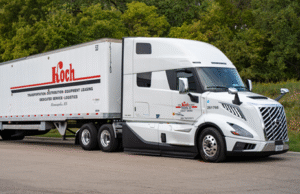For many years, the Federal Motor Carrier Safey Administration (FMCSA) required carriers to perform background checks on all drivers that were hired or leased on with the company.
That requirement listed a few specifics about what was to be checked — but few details were provided about who must be contacted, what questions the would-be employer must ask, and what happened if the contact couldn’t (or wouldn’t) provide information. Some carriers had thick personnel files for each driver, while others had very little information available.
Because communication between individual states and between states and the FMCSA was haphazard, the process of requesting background information was often also. For example, an accident report in one state might never make it back to the state that issued the driver’s CDL; therefore, the incident wouldn’t show up on the driver’s motor vehicle record (MVR).
The FMCSA’s Pre-Employment Screening Program (PSP) was created to streamline that process and provide a centralized source for carriers to find records of any accidents or incidents in which a driver had been involved, as well as inspection records.
What’s in your PSP?
The PSP has accomplished its intended purpose in making more information available — but it’s still far from a perfect system. Many drivers still don’t know what their PSP record shows, and the carriers who receive the information may look at it in entirely different ways.
The PSP report shows any FMCSA “reportable” crashes in which you have been involved while driving a commercial motor vehicle (CMV) during the past five years. Reportable crashes are those in which there is a fatality, an injury that requires transport for medical care (ambulance), or in which one or both vehicles can’t be driven and must be towed. The PSP also shows the results of any driver or vehicle inspections you have had in the past three years. Any citations you receive as a result of either an accident or an inspection can be included in your PSP report.
What the PSP report does NOT show are accidents that happen in your personal vehicle or tickets you receive outside of your CMV. However, a ticket you receive in your work truck could end up on both your PSP report and your state’s (MVR) … or not. Some jurisdictions don’t report to the PSP at all, while a local officer who performed a brief vehicle inspection might.
That’s why it’s important for every driver to know what their PSP report contains.
Further, if you receive a citation and you later are found not guilty in court or the charge is dismissed, you may need to file a request for a review of your record so it can be corrected.
How do carriers use the PSP?
As the name implies, the PSP is used by carriers as a part of the screening process for drivers they want to hire. The FMCSA does not assign a score of any kind to the PSP. Although the information can be identical to data in the carrier’s Compliance, Safety, Accountability (CSA)v record, the two programs are not the same.
One big issue with the PSP report is that carriers interpret the information it contains differently. Some use their own scoring process, assigning “points” to each crash or violation and using a total score when making their hiring decisions. Other carriers may look for particular violations, such as excessive speeding, failure to use seat belts and so on. In addition, since use of the PSP is voluntary, some carriers don’t use it at all.
Some carriers look for patterns of behavior in a driver’s PSP. If, for example, if you have multiple violations for failure to secure cargo, a carrier may believe you haven’t learned from those violations and will also fail to secure their cargo.
Many vehicle violations could be interpreted as being caused by a driver not inspecting equipment — or possibly that you worked for a carrier that provided older, poorly maintained equipment.
How do I know if my PSP record is good?
Since the PSP contains information that can keep you from getting a job you want, it’s important that you know what’s in it. Start by going to psp.fmcsa.dot.gov/psp/home and sign up. You can review what’s in your PSP for free. You can also sign up for a free notification service to receive an email whenever there’s a change to your record so you can make sure it’s accurate.
Knowing what’s on your PSP allows you to be sure the employment application you fill out matches your actual record. If a crash was relatively minor, remembering dates, locations and details might be difficult … but if you leave it off your application and it turns up on your PSP report, it could be considered a falsification.
What if I find a mistake on my record?
If you find something on your PSP record that isn’t true, or if something has changed — for example, you’ve been acquitted of a violation for which you received a violation — you can request a review at dataqs.fmcsa.dot.gov.
If you submit a request, along with the paperwork showing the acquittal, the violation will be removed from your record. If you are convicted of a lesser charge, your record will reflect that too; however, you may have to request a review and provide documentation.
Some charges are dealt with by adjudication, such as a court supervision agreement that removes a violation from your record if you attend classes or don’t get another ticket during a specified time period. If you’ve met the requirements, the original violation can be removed from your PSP also, if you request a review and submit the paperwork.
Violations issued to drivers who are part of a team sometimes end up on the PSP record of both drivers. Filing a request for review can start the process of getting your record corrected, but you may need to send copies of your record of duty status or other documentation.
Even if you aren’t successful getting information removed from your PSP record, knowing what’s on it can help you prepare to answer any questions asked by a prospective employer. If you have a reasonable explanation about a reported violation, the carrier may be more comfortable making a decision to hire you than if you didn’t know it was on your record.
Cliff Abbott is an experienced commercial vehicle driver and owner-operator who still holds a CDL in his home state of Alabama. In nearly 40 years in trucking, he’s been an instructor and trainer and has managed safety and recruiting operations for several carriers. Having never lost his love of the road, Cliff has written a book and hundreds of songs and has been writing for The Trucker for more than a decade.
















This article provides a thorough explanation of the importance of understanding your PSP report as a commercial driver. It highlights how carriers use this information during the hiring process and emphasizes the need for drivers to regularly review their records for accuracy. The tips on correcting mistakes and preparing for potential employer questions are particularly valuable. For more insights on driver records and background checks, visit https://www.exactbackgroundchecks.com/motor-vehicle-reports-a-comprehensive-overview/. A must-read for any driver looking to stay informed and improve their employment prospects!